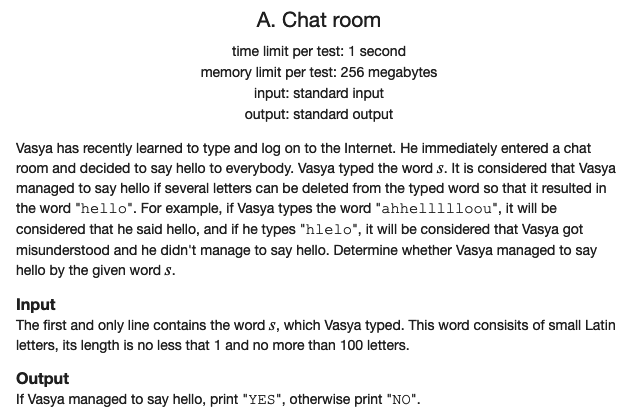Chat Room
October 4, 2023 · 604 words · 3 min
Do people still use skype? Asking for a friend.
Introduction
Problem Statement

So this guy makes a lot of typos (since he just learned to type). We are asked to create a tool that will convert whatever jumble of characters he types into the world “hello”, if and only if, we can delete some letters to reveal the word “hello”.

As you can see here, we can delete one ‘h’, one ‘a’, three ’l’s, one ‘o’, and one ‘u’. After all of our deletions, we are left with the string “hello”
Concept
We can initialize an array with the letters of the word “hello” and while we traverse the input, mark off the letters we encounter in order.
Implementation
First we need to handle the input, as well as initalize our array of letters.
use std::io::stdin;
fn main() -> Result<(), String> {
let mut buffer = String::new();
let word: [char; 5] = ['h', 'e','l', 'l', 'o'];
let _ = stdin().read_line(&mut buffer);
Ok(())
}
Here we create a 5 character array that will spell out the word “hello”. We will use this as a way of striking off characters we encounter in the input that we are handling.
We don’t need to parse anything, so we can go straight into the logic of our program.
let mut index = 0;
for character in buffer.trim().chars() {
if index < 5 && character == word[index] {
index += 1;
}
}
We are iterating over every character that was supplied by the input. We then reach a conditional that checks to see if we haven’t reached the end of our 5 character array.
The second portion of the conditional checks to see if the character of the input equals the current character of the “hello” array we are indexing. If we are, we strike out the current character in the “hello” array, by incrementing the index.
Let’s go through an example,
input = hhhellloooa
array = [h, e, l, l, o]
index = 0
Iteration #1
Since the first character of input equals the first character of the
array,
Array = [e, l, l, o ]
index = 1
Since we haven't reached the end of the array, we loop back again.
Iteration #2
Since the current character of the input doesn't equal 'e' in the
array, we do nothing.
Array = [e, l, l, o]
index = 1
Since the we haven't reached the end of the array, we loop back again.
Iteration #3
Same as iteration #2
Iteration #4
Since the current character of the input does equal 'e' in the array,
Array = [l, l, o]
index = 2
Since we haven't reached the end of the array, we loop back again.
Iteration #8
Since the current character fo the input does equal 'o' in the array,
Array = []
index = 5
Since we have reached the end of the array, we stop.
Now if the index is greater than the length of the array from the beginning of the function, we know that we can create the string “hello” from the input.
if index > 4 {
println!("YES");
} else {
println!("NO");
}
And that is the program! Here is the full code solution.
Full Code Solution
use std::io::stdin;
fn main() -> Result<(), String> {
let mut buffer = String::new();
let word: [char; 5] = ['h', 'e','l', 'l', 'o' ];
let _ = stdin().read_line(&mut buffer);
let mut index = 0;
for character in buffer.trim().chars() {
if index < 5 && character == word[index] {
index += 1;
}
}
if index > 4 {
println!("YES");
} else {
println!("NO");
}
Ok(())
}